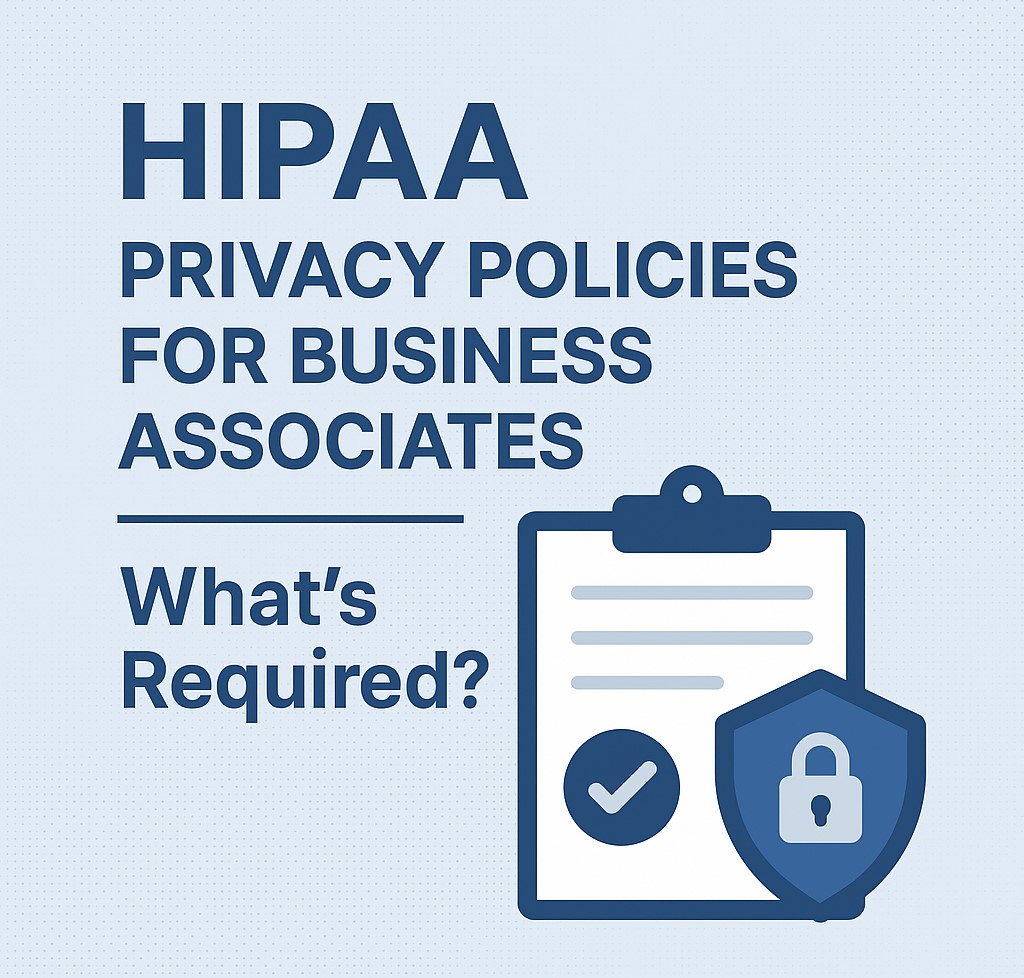HIPAA Privacy Policies for Business Associates: What’s Required?
The Health Insurance Portability and Accountability Act (HIPAA) sets strict standards to protect the privacy and security of patients’ Protected Health Information (PHI). While covered entities such as healthcare providers and health plans are directly responsible for HIPAA compliance, Business Associates (BAs)—vendors, contractors, or third-party service providers who handle PHI—are also legally required to comply.
To ensure compliance, Business Associates must establish and maintain HIPAA Privacy Policies that safeguard PHI from unauthorized access, use, or disclosure. This article explains what HIPAA requires from Business Associates, key elements of privacy policies, and best practices for compliance.
Who Are Business Associates Under HIPAA?
A Business Associate (BA) is any person or organization that performs functions or activities involving the use or disclosure of PHI on behalf of a covered entity.
Examples of Business Associates include:
-
Medical billing and coding companies
-
Cloud storage and IT service providers
-
Legal, accounting, or consulting firms handling PHI
-
Data analytics and claims processing vendors
-
Telehealth technology or software vendors
If your company handles, stores, or transmits PHI for a covered entity, you are a Business Associate—and you must implement HIPAA-compliant privacy policies.
Why HIPAA Privacy Policies Matter for Business Associates
HIPAA Privacy Policies are not just paperwork—they form the foundation of your compliance program. These policies:
-
Define how PHI is collected, used, and disclosed
-
Establish safeguards to protect patient data
-
Reduce the risk of data breaches and penalties
-
Demonstrate your organization’s commitment to HIPAA compliance
Failure to implement privacy policies can result in civil and criminal penalties, including fines ranging from $100 to $50,000 per violation and potential legal action.
What HIPAA Requires from Business Associates
Business Associates must comply with both the HIPAA Privacy Rule and the HIPAA Security Rule, which mandate the following:
1. Privacy Policies and Procedures
Business Associates must develop written privacy policies that describe:
-
How PHI is collected, used, and disclosed
-
The process for responding to requests for access, amendments, or restrictions
-
How to handle disclosures to law enforcement or third parties
-
Procedures for de-identifying PHI (if applicable)
These policies should align with the covered entity’s privacy practices and any terms in the Business Associate Agreement (BAA).
2. Business Associate Agreement (BAA)
Before handling PHI, a Business Associate must sign a Business Associate Agreement with the covered entity.
The BAA must:
-
Specify permitted and required uses of PHI
-
Require safeguards to prevent unauthorized disclosure
-
Ensure subcontractors are also HIPAA-compliant
-
Outline breach notification responsibilities
Without a valid BAA, both the covered entity and the BA risk serious compliance violations.
3. Workforce Training
Every employee, contractor, or agent who has access to PHI must receive HIPAA Privacy and Security training.
Training should cover:
-
Privacy rules and patient rights
-
Proper handling and sharing of PHI
-
Breach reporting procedures
-
Security awareness and best practices
Regular training reinforces compliance and minimizes the risk of accidental disclosures.
4. Safeguards to Protect PHI
Business Associates must implement administrative, physical, and technical safeguards to protect PHI, including:
-
Administrative safeguards: Access control policies, workforce training, risk assessments
-
Physical safeguards: Secure workstations, locked storage, restricted facility access
-
Technical safeguards: Encryption, user authentication, audit logs
These measures ensure PHI remains protected whether it’s stored electronically or on paper.
5. Breach Notification Procedures
Under the HIPAA Breach Notification Rule, Business Associates must:
-
Report any PHI breach to the covered entity without unreasonable delay (within 60 days)
-
Provide details on the type of breach, affected individuals, and mitigation actions
-
Maintain documentation of reported incidents
Prompt breach reporting helps covered entities notify affected individuals and regulators on time.
6. Documentation and Record Retention
HIPAA requires that all privacy policies, procedures, training records, and breach reports be maintained for at least six years.
Proper documentation provides evidence of compliance in case of an audit or investigation by the Office for Civil Rights (OCR).
Best Practices for HIPAA Privacy Policy Implementation
To ensure full compliance, Business Associates should follow these best practices:
-
Conduct Regular Risk Assessments
Evaluate potential threats to PHI and update your safeguards accordingly. -
Review and Update Policies Annually
Update privacy policies to reflect changes in regulations, technology, or operations. -
Train Employees Continuously
Reinforce compliance with ongoing HIPAA refresher training and updates. -
Encrypt All PHI
Use encryption for PHI stored on servers, mobile devices, or transmitted electronically. -
Monitor and Audit Access
Maintain logs of who accesses PHI and review them regularly for unusual activity. -
Prepare for OCR Audits
Keep documentation readily available and designate a compliance officer to handle inquiries.
Penalties for Non-Compliance
If a Business Associate fails to implement required privacy policies, the Department of Health and Human Services (HHS) may impose severe penalties, including:
-
Tier 1: $100–$50,000 per violation (lack of knowledge)
-
Tier 2: $1,000–$50,000 per violation (reasonable cause)
-
Tier 3: $10,000–$50,000 per violation (willful neglect, corrected)
-
Tier 4: $50,000 per violation (willful neglect, uncorrected)
Beyond financial costs, non-compliance can damage reputation and lead to the loss of client trust.
Conclusion
For Business Associates, HIPAA Privacy Policies are essential to maintain compliance, protect patient data, and build credibility in the healthcare industry.
By developing strong privacy policies, training your workforce, and maintaining robust safeguards, your organization can minimize risks and ensure that PHI is handled responsibly and securely.
If your business handles PHI on behalf of a healthcare provider, now is the time to review your privacy policies and strengthen your compliance framework.
